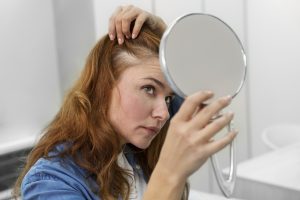Hair loss and anxiety

by Anxiety UK and Alopecia UK
Why does experiencing hair loss lead to feelings of stress and anxiety?
Hair loss is more than just a physical thing. To anyone who has experienced it, either directly or indirectly through a loved one, it can have a profound impact on mental wellbeing.
Alopecia is another word for hair loss. Our friends at the charity Alopecia UK tell us that there are lots of different types of alopecia, including but not limited to androgenetic alopecia, telogen effluvium, alopecia areata, frontal fibrosing alopecia, lichen planopilaris, CCCA, trichotillomania, and traction alopecia. Regardless of the type of hair loss experienced, the impact on our mental health can be the same.
It is frequently reported that people who experience hair loss also have stress and anxiety but why is this? With the help of Alopecia UK, we explore some reasons why losing our hair can leave us feeling stressed and anxious.
Loss of control
Losing our hair can feel like we lose control over our physical appearance. Hair loss conditions can be unpredictable. For some people, such as those with scarring alopecias, hair loss will be permanent, but for others, such as those with alopecia areata or telogen effluvium, hair loss may be temporary. Regardless of the type of hair loss experienced, there can often be uncertainty around exactly how much hair will be lost, whether the hair will return or not, and how quickly it will fall out/regrow. This uncertainty can also contribute to those feelings of not being in control of a situation, and this can naturally lead to increased stress levels and feelings of anxiety.
Societal standards and stigma
Our perceived societal expectations to look a certain way, can contribute to a heightened sense of self-consciousness when experiencing hair loss. For some people, hair is intricately linked to their self-image, and loss of hair can lead to feelings of inadequacy and reduced confidence. It can be difficult for people to talk about their hair loss, and some can feel stigmatised. This can be especially true for women and children, as there is not the same societal acceptance of hair loss in these groups as there is in men. This is not to say that men do not encounter any difficulties with hair loss, but rather that society can be a bit more accepting of the image of a bald man.
Fear of negative reactions and social anxiety
Living with a newly altered appearance can lead to anxiety around how others will react to you. This could be anything from being worried about how a relative who you haven’t seen for a while may comment on your appearance, feeling anxious that a colleague may treat you differently after losing your hair, or feeling stressed that a stranger will pass judgement on your appearance. For some people with hair loss, these fears can lead to social anxiety, which, if not managed, can lead to the avoidance of social interactions all together.
Managing the emotions of others
It is not just the person who loses their hair who is affected. Family and close friends can be emotionally impacted from either seeing their loved one’s appearance change and/or seeing someone close to them upset. It can be very stressful feeling responsible for the emotional well-being others, and knowing our own mental health struggles are affecting others around us can lead to greater anxiety.
Loss of sense of identity
For some of us, our hair serves as a form of self-expression and identity. Losing our hair can create a shift in how we see ourselves and can rock our self-esteem and confidence. This can ultimately lead to wider impacts on personal relationships, work, or school.
Pressures associated with camouflaging hair loss
There are some incredible products that can help those who wish to conceal their hair loss and make it less visible to others. This includes wigs, toppers, turbans, hats, scarves, false lashes, and brows, make up, camouflage powders and sprays, and more.
These products can help those with hair loss to feel and look like themselves again but can sometimes lead to increased feelings of anxiety. Worries can include headwear or make-up coming off and hair loss being revealed at an unexpected moment.
Hair loss can lead to many challenging feelings that can ultimately result in feeling stressed and anxious. But there are things you can do to help manage difficult feelings.
What can I do to help manage my feelings of stress and anxiety regarding my hair loss?
Stress and anxiety can be managed in a variety of ways, with the right approach needing to be personalised as no two people with anxiety will have exactly the same needs. The management of anxiety often comprises exploration of a number of different treatment options including self-care strategies such as breathing techniques, self-help books and exercise such as yoga and swimming, through to talking therapies such as Cognitive Behavioural Therapy (CBT), counselling and compassion focused therapy (CFT) and psychiatric medication.
It’s important however firstly to recognise when you are experiencing heightened levels of anxiety compared to how you have felt previously. There are some simple measures that are used in NHS talking therapy services that can help you assess the level of anxiety that you may have. This assessment tool is used by medical professionals, and can help you to see whether your anxiety is mild, moderate or severe.
Then we recommend reading about anxiety as there are many different forms of anxiety from simple or specific phobias, through to more complex anxiety disorders such as social anxiety disorder, agoraphobia and generalised anxiety disorder. Read more about the various anxiety types here: https://www.anxietyuk.org.uk/types-of-anxiety/ and also get hold of a good self-help book. We recommend the Overcoming Series as these are based on the principles of CBT and work well as a stand-alone resource, as well as when used whilst also accessing a course of therapy. See the Anxiety UK online shop for details: https://www.anxietyuk.org.uk/product-category/book/.
Mild levels of anxiety generally respond well to self-care techniques of which there are many from learning how to use the breath to bring about calm through to visualisation tools and mindfulness, see: https://www.anxietyuk.org.uk/self-care-tools/.
More heightened levels of anxiety may benefit from you undertaking a course of talking therapy to help you gain confidence in managing anxiety through for example, exploration of the linkages between emotions, thoughts, physical/bodily sensations as well as our environment. Other therapies such as compassion focused therapy (CFT) can help to calm the critical voice that so often is present with anxiety and provides like CBT, strategies for managing anxiety through developing self-compassion as well as compassion for others. Anxiety UK’s TherapGuide tool can help you decide which talking therapy might be beneficial for you in your anxiety recovery journey. Find out more here: https://www.anxietyuk.org.uk/therapguide/
Some people find that medication is helpful either on its own, or in combination with talking therapy treatment, and there are a range of options available. Find out more about psychiatric medication for treating anxiety here: https://www.choiceandmedication.org/anxietyuk/condition/anxiety/
Living with anxiety can be an isolative experience but it doesn’t need to be, and whilst anxiety can be very unpleasant to live with, and in its severest of forms, disabling, it is treatable. Speaking to others who have experienced similar issues can be hugely cathartic in the recovery process. Anxiety UK runs peer-led, anxiety support groups every week as well as a range of courses to help you control anxiety, rather than anxiety control you. Find out more about Anxiety UK’s groups and courses here: https://www.anxietyuk.org.uk/get-help/anxiety-uk-courses-and-groups/
Alopecia UK also offers options for peer support relating to hair loss. Being in touch with others who have experienced hair loss, can help to reduce feelings of anxiety. Gaining information and support from others with hair loss, can increase feelings of confidence and wellbeing. Alopecia UK has a variety of peer support options for people affected by hair loss, including face-to-face support groups, private Facebook groups, online groups, and events. Alopecia UK’s website contains a huge amount of information to help empower people to live well with hair loss.
And finally, to stay up-to-date on all things anxiety, subscribe to Anxiety UK’s podcast Series And Breathe…Welcome to Calm Club: https://www.anxietyuk.org.uk/get-involved/webinars/ or join our friendly anxiety community: https://www.anxietyuk.org.uk/get-help/become-a-member/






